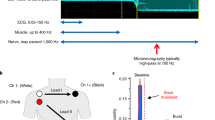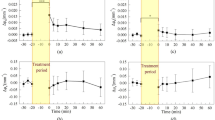Abstract
HUMAN skin presents a high impedance to alternating current of low frequency1. The impedance is greatly reduced if the surface layers of the skin are abraded2. When the frequency of the applied a.c. is raised above 10 c/s, the impedance falls; the equivalent circuit is a polarization impedance in parallel with a resistance3. The impedance of rabbit or pig skin is less than that of human skin, and is also less dependent on frequency (Fig. 1).
This is a preview of subscription content, access via your institution
Access options
Subscribe to this journal
Receive 51 print issues and online access
$199.00 per year
only $3.90 per issue
Buy this article
- Purchase on Springer Link
- Instant access to full article PDF
Prices may be subject to local taxes which are calculated during checkout
Similar content being viewed by others

References
Plutchik, R., and Hirsch, H. R., Science, 141, 927 (1963).
Lawler, J. C., Davies, M. J., and Griffith, E. C., J. Invest. Derm., 34, 301 (1960).
Yokota, T., and Fujimori, B., Jap. J. Physiol., 12, 200 (1962).
Tregear, R. T., in Progress in Biological Sciences in Relation to Dermatology (Camb. Univ. Press, 1964).
Author information
Authors and Affiliations
Rights and permissions
About this article
Cite this article
TREGEAR, R. Interpretation of Skin Impedance Measurements. Nature 205, 600–601 (1965). https://doi.org/10.1038/205600a0
Issue Date:
DOI: https://doi.org/10.1038/205600a0
This article is cited by
-
Characteristics of impedance properties of metallic bioelectrodes
Bulletin of Experimental Biology and Medicine (1979)
-
Electrical properties of the epidermal stratum corneum
Medical & Biological Engineering (1976)
-
The Permeability of Mammalian Skin to Ions**From the Chemical Defence Experimental Establishment, Porton Down, Wilts., England.
Journal of Investigative Dermatology (1966)
Comments
By submitting a comment you agree to abide by our Terms and Community Guidelines. If you find something abusive or that does not comply with our terms or guidelines please flag it as inappropriate.


